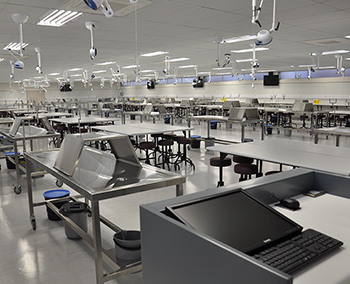Latest News Archive
Please select Category, Year, and then Month to display items
![]()
Prof Marian Tredoux, Associate Professor in the
Department of Geology at the University of the Free State,
recently had a mineral named after her.
Photo: Sonia Small
Prof Marian Tredoux is a geochemist and lecturer in the Department of Geology at the University of the Free State (UFS). Her research interests are rocks, particularly the chemistry of rocks and the minerals they are composed of – chemicals similar to those found in laboratories, although they occur in nature.
Prof Tredoux started her research career at the University of the Witwatersrand (Wits), after which she spent a number of years at the University of Cape Town (UCT). For the past 11 years, she has been at the UFS, which has brought her in close proximity of her primary field-research area in Barberton. This fascinating part of the country has been the focus of her research for 30 years. She has always been intrigued by the earth's crust in this area, which she describes as "very old, very strange, and very interesting".
Prof Tredoux has been collaborating with colleagues and peers overseas in an attempt to unravel the intricacies of this unusual geological area. Some of these colleagues recently discovered a new mineral in one of the rock formations of the Barberton mountain range. They decided to name the mineral after Prof Tredoux, dubbing it tredouxite. "I am very honoured by this, and very grateful that all these years of collaboration are being acknowledged," Prof Tredoux said.
New modern dissection hall ensures optimal learning experience for medical students
2015-12-14

New Dissection Hall in the Francois Retief Building on the Bloemfontein Campus.
Photo: Stephen Collett
|
The School of Medicine in the Faculty of Health Sciences at the university opened its doors on 6 June 1969. Three years later, a dissection hall for anatomy training was added to the school. This year, because of the prospective growth in the number of medical students as well as in changing methods of teaching and training, a new modern Dissection Hall has been completed on the Bloemfontein Campus. This ensures that students receive an optimal learning experience during dissection tuition.
The Dissection Hall was built as a double-storey wing to the existing Francois Retief Building. Covering 733m², the new facility is on the first floor - the same level as the existing hall - to allow easy access between the two facilities. The ground floor, totalling 465m², houses various offices for 16 people.
The new hall has special lighting and modern equipment for the training of second-year medical students in dissection. The hall also has high-quality sound and computer equipment. A unique camera system allows students to follow dissection demonstrations on 10 screens in the hall. Dissection demonstrations are recorded, enabling lecturers to compile new visual aid material for teaching and learning.
The dissection programme for medical students is of critical importance, not only for acquiring anatomical knowledge, but also for developing critical skills in medical students.
The new hall is also used for clinical workshops and postgraduate teaching seminars, as well as workshops in orthopaedics (shoulder, hip, and knee), otorhinolaryngology, cardiothoracic surgery (valve and endoscopy), and anaesthesiology, among others.
Both present and future generations of medical students will benefit from this new world-class facility.